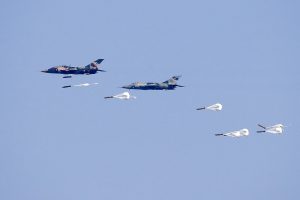The London-based rights group Amnesty International has called on suppliers of aviation fuel to suspend their shipments to Myanmar, presenting evidence that shipments are being diverted from civilian to military uses.
The call was made in a new report, released yesterday, which documented how shipments from foreign firms have allowed the country’s air force to conduct an increasing number of air attacks on mostly civilian targets.
“The Myanmar military relies on aviation fuel to power the aircraft used in these attacks, a type of fuel that foreign and domestic companies supply, import, handle, store and distribute,” the report states. It called on all companies involved in this supply chain “must stop facilitating the provision of aviation fuel to Myanmar and, where applicable, responsibly disengage.”
Since shortly after the February 2021 coup, activists have been calling for foreign governments to restrict the military’s access to aviation fuel. The demands have grown more urgent as the military junta, facing increasing difficulties in repressing the resistance to its rule, has employed its air force against civilian populations in various parts of the country.
The Amnesty report documents 16 air attacks between March 2021 and August 2022, which took place in Kayah, Kayin, and Chin states and Sagaing Region. As one witness to an air attack told Amnesty’s researchers, “Every time I hear the planes flying over our village, I feel unsafe and afraid.” The air war culminated in last month’s air strike on a concert in Hpakant township, Kachin State, which killed as many as 80 people, including artists and musicians.
The Amnesty report traces the supply chain of aviation fuel “from the port where the fuel originally departs to air strikes conducted by the Myanmar air force that amount to war crimes.”
Much of this chain centers on Puma Energy, which since 2015 has been “the main foreign business involved in the handling, storage, and distribution of aviation fuel in Myanmar.” The firm is largely owned by the global commodity trading giant Trafigura, and operates in Myanmar through a subsidiary, Puma Energy Asia Sun (PEAS), and a joint venture, National Energy Puma Aviation Services (NEPAS).
Using leaked company documents, corporate filings, vessel-tracking data, satellite imagery, and interviews with defectors from the Myanmar Air Force (MAF), Amnesty shows how the two firms have played a central role in the transfer of aviation fuel from the PEAS-managed Thilawa port in Yangon to storage facilities at both commercial and military sites.
Puma Energy told the rights group that between the February 2021 coup and October 5, 2022, it limited its operations to the provision of aviation fuel for civilian purposes. But Amnesty reported that “civilian and military use of aviation fuel is inextricably linked,” that shipments can be easily diverted to military uses, and that storage facilities managed by NEPAS are often linked to military storage facilities.
After being presented with this evidence, Puma Energy sent a letter to Amnesty in which it said that it was going to leave Myanmar because it had received reports “of incidents where the MAF had been able to breach controls that were put in place to maintain the segregation of civilian supply.”
But Amnesty reports that several other companies are also present in the aviation fuel supply chain. These include global and regional oil and gas companies the U.S. firms Chevron and ExxonMobil, Russia’s Rosneft, China’s PetroChina and Thai Oil, “as well as maritime insurers, vessel owners, shipping agents, and truck distributors.”
It concluded by calling on all of these companies to remove themselves from a supply chain that is literally fueling attacks on Myanmar’s civilian population that likely amount to war crimes.
“These air strikes have devastated families, terrorized civilians, killed and maimed victims. But if the planes can’t fuel up, they can’t fly out and wreak havoc,” Amnesty’s Secretary General Agnès Callamard said in a statement accompanying the report’s release. “Today we are calling on suppliers, shipping agents, vessel owners and maritime insurers to withdraw from a supply chain that is benefiting the Myanmar Air Force.”

































